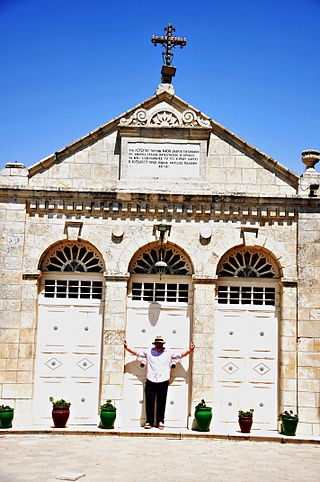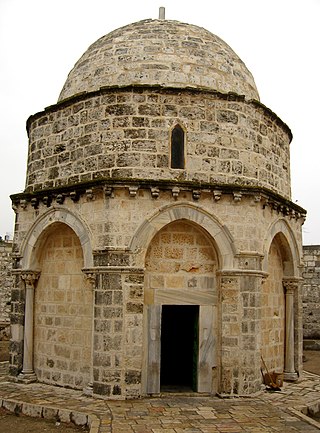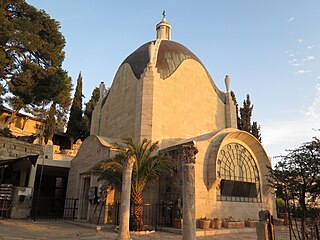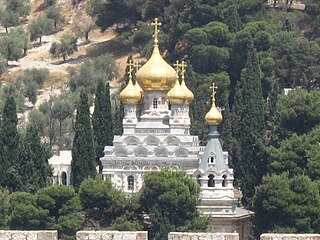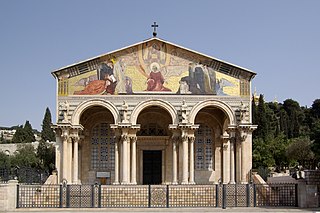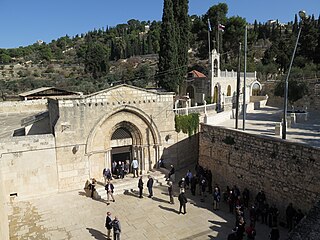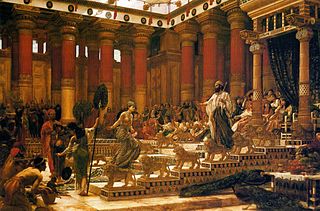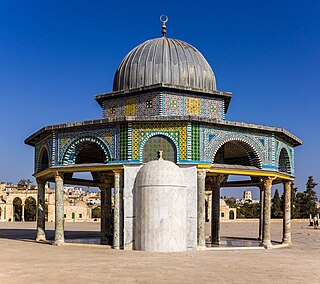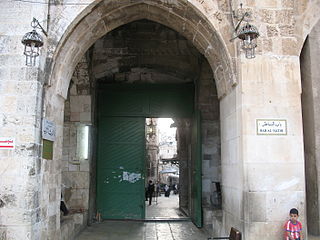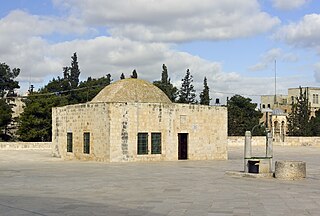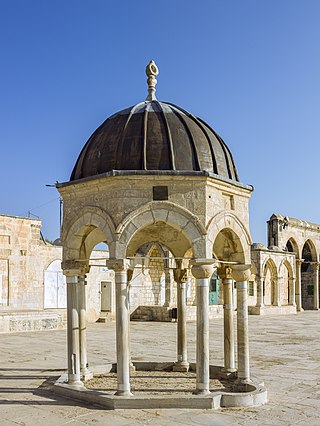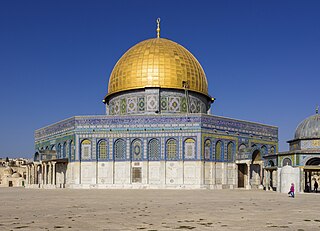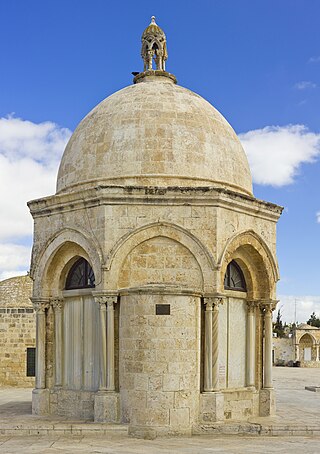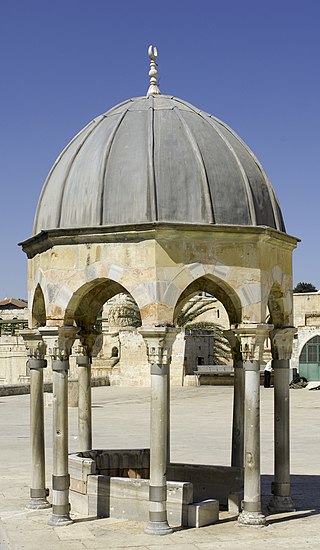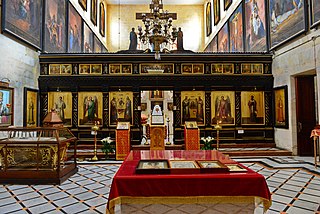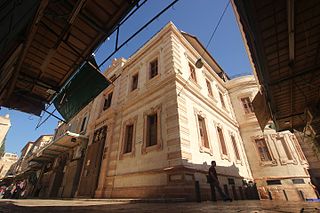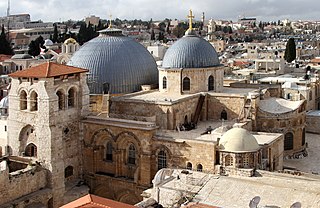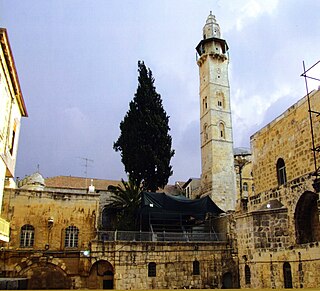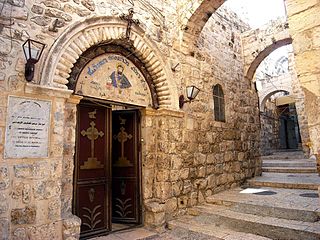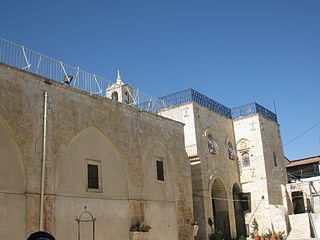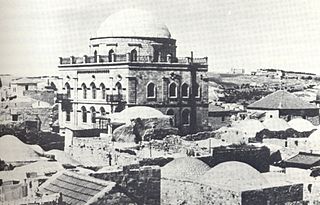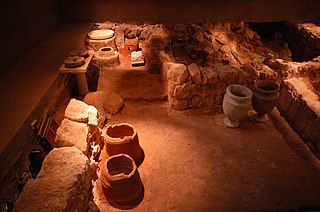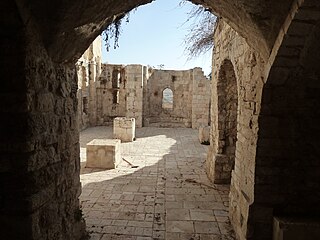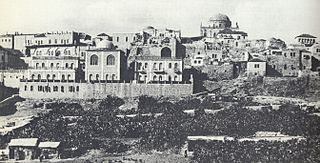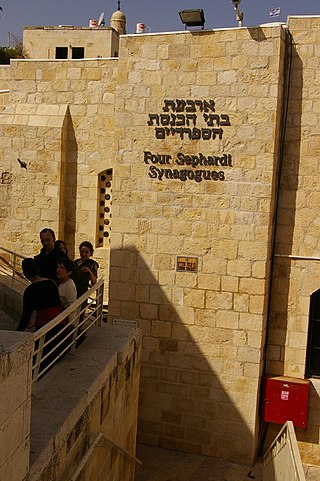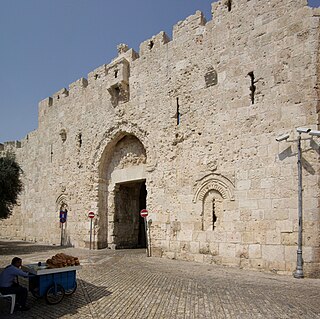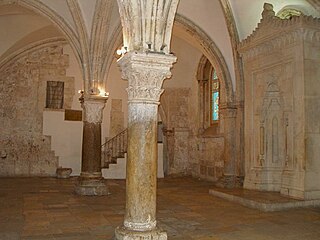Self-guided Sightseeing Tour #2 in Jerusalem, Israel
Legend
Guided Free Walking Tours
Book free guided walking tours in Jerusalem.
Guided Sightseeing Tours
Book guided sightseeing tours and activities in Jerusalem.
Tour Facts
7.6 km
280 m
Experience Jerusalem in Israel in a whole new way with our self-guided sightseeing tour. This site not only offers you practical information and insider tips, but also a rich variety of activities and sights you shouldn't miss. Whether you love art and culture, want to explore historical sites or simply want to experience the vibrant atmosphere of a lively city - you'll find everything you need for your personal adventure here.
Activities in JerusalemIndividual Sights in JerusalemSight 1: Viri Galilaei Church
The Viri Galilaei Church is a Greek Orthodox church located at the northern peak of the Mount of Olives in East Jerusalem. It is part of the Monastery of Little Galilee on the Mount of Olives, which belongs to the Greek Orthodox Patriarchate of Jerusalem, and serves as the private residence of the Patriarch.
Sight 2: Chapel of the Ascension
The Chapel of the Ascension is a chapel and shrine located on the Mount of Olives, in the At-Tur district of Jerusalem. Part of a larger complex, historically it started as part of a Christian church and monastery, which later became an Islamic mosque, Zawiyat al-Adawiya, and is located on a site traditionally believed to be the earthly spot where Jesus ascended into Heaven after his Resurrection. It houses a slab of stone believed to contain one of his footprints. This article deals with two sites; the Christian site of the Ascension, and the adjacent but separate mosque built over an ancient grave.
Sight 3: Dominus Flevit Church
Dominus Flevit is a Roman Catholic church on the Mount of Olives, opposite the walls of the Old City of Jerusalem in Israel. During construction of the sanctuary, archaeologists uncovered artifacts dating back to the Canaanite period, as well as tombs from the Second Temple and Byzantine eras.
Sight 4: Church of Mary Magdalene
The Church of Mary Magdalene is an Eastern Orthodox Christian church located on the Mount of Olives, directly across the Kidron Valley and near the Garden of Gethsemane in Jerusalem.
Sight 5: Church of All Nations
The Church of All Nations, also known as the Church of Gethsemane or the Basilica of the Agony, is a Catholic church located on the Mount of Olives in East Jerusalem, next to the Garden of Gethsemane. It enshrines a section of bedrock where Jesus is said to have prayed before his arrest.
Sight 6: Tomb of the Virgin Mary
Church of the Sepulchre of Saint Mary, also Tomb of the Virgin Mary (Hebrew: קבר מרים; or the Church of the Assumption, is a Christian church built around an ancient Judean rock-cut tomb in the Kidron Valley – at the foot of Mount of Olives, in East Jerusalem – believed by Eastern Christians to be the burial place of Mary, the mother of Jesus. The Status Quo, a 250-year old understanding between religious communities, applies to the site.
Sight 7: Throne of Solomon
The Throne of Solomon is the throne of King Solomon in the Hebrew Bible, and is a motif in Judaism, Christianity and Islam.
Sight 8: Dome of the Chain
Dome of the Chain is an Islamic free-standing domed building located adjacently east of the Dome of the Rock in the al-Aqsa Mosque compound in the Old City of Jerusalem. It is one of many small buildings that can be found scattered around the Al Aqsa Mosque. Its exact historical use and significance are under scholarly debate. Erected in 691–92 CE, the Dome of the Chain is one of the oldest surviving structures at the al-Aqsa Mosque compound.
Sight 9: Gate of the Watchman
The Inspector's Gate is one of the gates of the al-Aqsa Compound. It is the second-northernmost gates in the compound's west wall, after the Bani Ghanim Gate. It is north of the Iron Gate.
Sight 10: Dome of al-Khalili
The Dome of al-Khalili or the Hebronite is a small domed-building located in the central platform of the Temple Mount, north of the Dome of the Rock in the Old City of Jerusalem. The building is made of bricks which are currently tarnished. The Dome of al-Khalili was built in the early 18th century during Ottoman rule of Palestine in dedication to Shaykh Muhammad al-Khalili, a scholar of fiqh who died in 1734.
Sight 11: Dome of the Tablets
The Dome of the Spirits is a small dome resting on an octagonal base, located on the Temple Mount, in the Old City of Jerusalem.
Sight 12: Dome of the Rock
The Dome of the Rock is an Islamic shrine at the center of the Al-Aqsa mosque compound on the Temple Mount in the Old City of Jerusalem. It is the world's oldest surviving work of Islamic architecture, the earliest archaeologically attested religious structure to be built by a Muslim ruler and its inscriptions contain the earliest epigraphic proclamations of Islam and of the Islamic prophet Muhammad.
Sight 13: Dome of the Ascension
The Dome of the Ascension is an Islamic free-standing domed structure built by the Umayyads that stands just north the Dome of the Rock on the al-Aqsa compound in Jerusalem.
Sight 14: Dome of the Prophet
The Dome of the Prophet, also known as the Dome of the Messenger and the Dome of Muhammed is a free-standing dome located on the al-Masjid al-Aqsa enclave, in Quds. It is located on the northwest part of the terrace where the Dome of the Rock stands and it is near the Dome of the Ascension.
Sight 15: Small Kotel
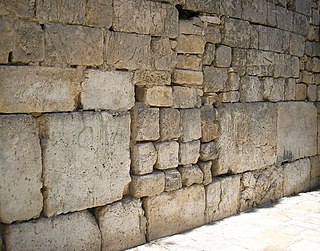
The Little Western Wall, also known as HaKotel HaKatan or just Kotel Katan, Kleiner Koisel, the Small, or Little Kotel, is a Jewish religious site located in the Muslim Quarter of the Old City of Jerusalem near the Iron Gate to the Temple Mount. The wall itself dates from the Second Temple period. It is part of the Western Wall, a retaining wall of the Herodian Temple compound which also contains the by far more famous and larger section known in the West as the Wailing Wall, and almost exactly faces the Holy of Holies. HaKotel HaKatan and its famous counterpart are the only sections of the almost 500 m long Western Wall not covered by houses, but the smaller free-standing section is not as crowded as the larger one. This section of the wall is of deep spiritual significance because of its close proximity to the Holy of Holies. However, it is not the closest location to the Holy of Holies, as there is a location in the Western Wall Tunnel which directly faces the Holy of Holies.
Sight 16: Ohel Yitzchak Synagogue
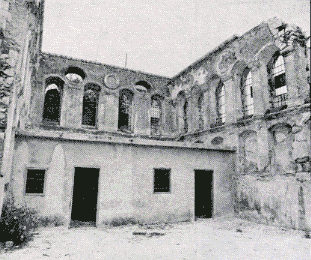
The Ohel Yitzchak Synagogue, also known as the Shomrei ha-Chomos Synagogue and the Ungarin Shul, is an Orthodox Jewish congregation and synagogue, located in the Muslim Quarter of the Old City of Jerusalem, Israel. It was built as a yeshiva in the 1870s by Kolel Shomrei HaChomos, an organization of Hungarian Jews, but was abandoned after the riots of 1938. Although the building was destroyed after 1948, it was reopened in October 2008 after acquisition by a Religious Zionist group and subsequent refurbishment.
Sight 17: Shuvu Banim Yeshiva
Shuvu Banim is a yeshiva in the Old City of Jerusalem with 1,500 students. It was founded in 1978 in Bnei Brak by Rabbi Eliezer Berland, a convicted sex offender and fraudster who is still the rosh yeshiva. The yeshiva was declared a cult by The Israeli Center for Cult Victims in 2018.
Sight 18: Alexander Nevsky Church
The Alexander Nevsky Church is a church in the Alexander Courtyard of the Imperial Orthodox Palestine Society in the Christian Quarter in the Old City of Jerusalem.
Sight 19: Alexander Compound
The Alexanderhof is a historic building complex of the Imperial Orthodox Palestine Society with currently unclear ownership in the Christian Quarter in the Old City of Jerusalem.
Sight 20: Church of the Holy Sepulchre
The Church of the Holy Sepulchre, also known as the Church of the Resurrection, is a fourth-century church in the Christian Quarter of the Old City of Jerusalem. The church is also the seat of the Greek Orthodox Patriarchate of Jerusalem. Some consider it the holiest site in Christianity and it has been an important pilgrimage site for Christians since the fourth century.
Sight 21: Mosque of Omar
The Ayyubid Mosque of Omar is an Islamic place of worship inside the Old City of Jerusalem. It is located opposite the southern courtyard of the Church of the Holy Sepulchre, in the Muristan area of the Christian Quarter. The mosque is not open to tourists, and can be accessed only for praying.
Sight 22: Maronite Church
Maronite Catholic Patriarchal Exarchate of Jerusalem and Palestine is an exarchate of the Maronite Patriarchate of the Maronite Church immediately subject to the Patriarchate of Antioch of the Maronites. In 2017 there were 504 members. It is currently governed by archeparch Moussa El-Hage, OAM.
Wikipedia: Maronite Catholic Patriarchal Exarchate of Jerusalem and Palestine (EN)
Sight 23: St. Mark's Monastery
The Monastery of Saint Mark the Evangelist and the Virgin Mary is a Syriac Orthodox monastery in the Armenian Quarter of the Old City of Jerusalem and residence of the Syriac Orthodox Archbishop of Jerusalem. It is believed to be located on the site of house of Mary, mother of Mark the Evangelist; Syriac Christians believe that it was the place where the Last Supper was shared by Jesus and the Twelve Apostles, where the Apostles hid after the Passion and Crucifixion of Jesus, and where Jesus appeared to the Apostles after the Resurrection. The place claims to be the first church in Christianity. The monastery consists of the main church of Saint Mark and an adjacent chapel of Saint Behnam.
Sight 24: Syriac Church of St. Mark
The Monastery of Saint Mark the Evangelist and the Virgin Mary is a Syriac Orthodox monastery in the Armenian Quarter of the Old City of Jerusalem and residence of the Syriac Orthodox Archbishop of Jerusalem. It is believed to be located on the site of house of Mary, mother of Mark the Evangelist; Syriac Christians believe that it was the place where the Last Supper was shared by Jesus and the Twelve Apostles, where the Apostles hid after the Passion and Crucifixion of Jesus, and where Jesus appeared to the Apostles after the Resurrection. The place claims to be the first church in Christianity. The monastery consists of the main church of Saint Mark and an adjacent chapel of Saint Behnam.
Sight 25: St. Toros Church
The Holy Thoros Church is an Armenian church in the Armenian district of Jerusalem, Israel. It is next door to the Church of St. Jacob. More than 4,000 manuscripts are kept in the Church
Sight 26: Cardo
Get Ticket*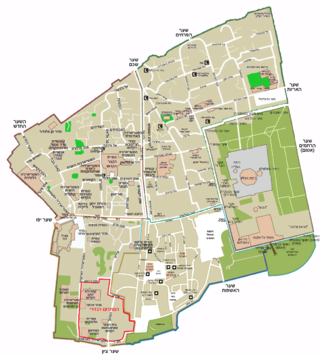
The Cardo was a central north-south oriented thoroughfare in Jerusalem during the Late Roman and Byzantine periods. Together with the east-west oriented Decumanus, it reflects typical Roman city planning. The term "Cardo" derives from the Latin word for "hinge," referring to role as the main north–south axis in Roman cities.
Sight 27: Tiferet Yisrael Synagogue
The Tiferet Yisrael Synagogue, most often spelled Tiferet Israel, also known as the Nisan Bak Shul, after its co-founder, Nisan Bak is a former prominent Hasidic Jewish congregation and synagogue, located in the Jewish Quarter of the Old City of Jerusalem, Israel. Designed by Nisan Bak, the former synagogue was completed in 1872 and partially destroyed in 1948.
Sight 28: Burnt House
The Burnt House Museum is a museum presenting an excavated house from the Second Temple period. It is situated 6 m (20 ft) below current street level in the Jewish Quarter of the Old City of Jerusalem.
Sight 29: Church of Saint Mary of the Germans
The Church of Saint Mary of the Germans was a Catholic church, built in Romanesque style, now in ruins, located in the Old City of Jerusalem on the northeast slope of Mount Zion.
Sight 30: Yeshivat HaKotel
Porat Yosef Yeshiva is a Sephardic yeshiva in Jerusalem, with locations in both the Old City and the Geula neighborhood. The name Porat Yosef means "Joseph is a fruitful tree" after the biblical verse Genesis 49:22.
Sight 31: The Four Sephardic Synagogue
The Four Sephardic Synagogues are a complex of four adjoining synagogues located in the Jewish Quarter of the Old City of Jerusalem.
Sight 32: Zion Gate
Zion Gate, also known in Arabic as Bab Harat al-Yahud or Bab an-Nabi Dawud, is one of the seven historic Gates of the Old City of Jerusalem.
Sight 33: Cenacle
The Cenacle, also known as the Upper Room, is a room in Mount Zion in Jerusalem, just outside the Old City walls, traditionally held to be the site of the Last Supper, the final meal that, in the Gospel accounts, Jesus held with the apostles.
Share
Disclaimer Please be aware of your surroundings and do not enter private property. We are not liable for any damages that occur during the tours.
GPX-Download For navigation apps and GPS devices you can download the tour as a GPX file.
